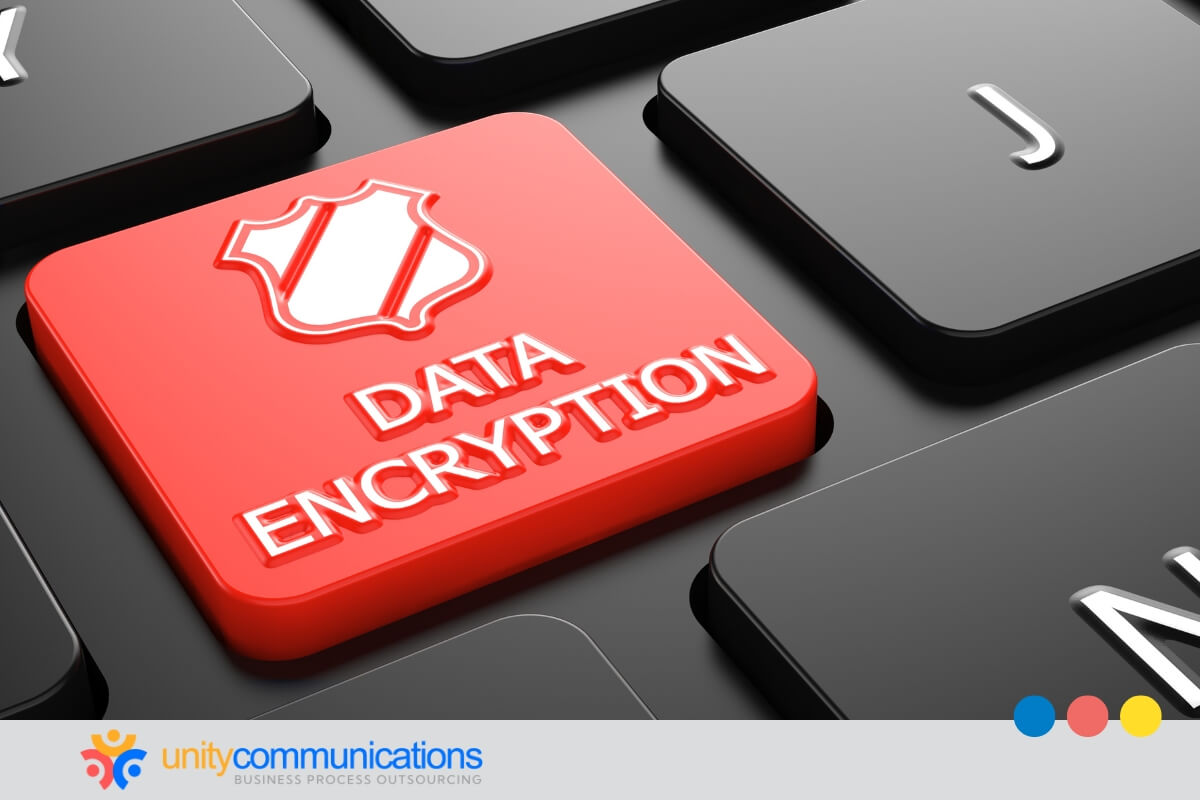Table of Contents
Recruitment process outsourcing (RPO) involves handling sensitive information, which can range from candidate résumés to background checks and proprietary client details. It is essential to hiring but also heightens responsibility.
As cyber threats become more sophisticated, client companies and service providers must prioritize data security. But how do you do that effectively?
This article explores why data security is critical in RPO services. We’ll examine the risks, relevant standards, and best practices to help protect recruitment data and ensure compliance.
Keep reading to understand the unique cybersecurity demands of this business process outsourcing (BPO) model.
4 data security standards and practices in RPO services

RPO providers are responsible for managing the hiring process. Therefore, they gain access to a wealth of sensitive information, such as:
- Personal identification details
- Employment histories
- Financial records
- Company-specific hiring strategies
- Health and medical information disclosed during pre-employment checks
- Background check results, including criminal records
- Confidential salary structures and compensation packages
The lack of robust data security measures makes sensitive information vulnerable to unauthorized access, attacks, and misuse.
The stakes are high. About 600 million cyberattacks happen daily, while over 2,000 breaches compromised customer data in 2024. IBM’s report revealed that the average global data breach cost reached over $4 million.
A cybersecurity threat can mean identity theft or employment fraud for candidates. For clients, it has dire consequences, such as reputational damage and legal penalties. RPO stakeholders must treat data security seriously to protect all parties involved, maintain compliance, and uphold the integrity of the recruitment process.
Here are data security best practices in RPO services:
1. Data encryption and secure storage
Data encryption involves converting sensitive information into an unreadable format using cryptography. This approach keeps intercepted data unreadable to anyone without authorization. Leading RPO firms also use advanced encryption standard (AES) 256-bit encryption, which is considered one of the most secure encryption methods available.
Secure storage means housing encrypted data in environments protected against physical and digital threats. This includes cloud storage solutions that:
- Comply with international security standards. Examples include ISO/IEC 27001, General Data Protection Regulation (GDPR), and SOC 2.
- Implement controls such as firewalls, intrusion detection systems, and restricted access.
RPO providers manage personal data, making their protection a legal and ethical obligation.
2. Access control and authentication protocols
Strict access control and authentication protocols limit who can access your recruitment information. This involves implementing role-based access control (RBAC), which restricts data availability based on a user’s job function.
For example, a recruiter could view candidate résumés but not client billing information. An administrator could oversee system settings without knowing candidate details.
Authentication protocols verify user identity before granting access to sensitive systems and data. RPO providers strengthen this process with multifactor authentication (MFA). It requires users to confirm their identities using two or more methods, including a password, a mobile code, or biometric data.
This extra layer of protection significantly reduces the risk of phishing and brute-force attacks compared to basic username-password logins.
Additional measures include:
- Single sign-on (SSO) to streamline and secure user access across platforms
- Session timeouts to automatically log out inactive users
- Audit logs to track who accessed what data and when for transparency and accountability
These measures create a secure access environment that minimizes insider threats and reinforces accountability across the entire RPO workflow.
3. Candidate data privacy and consent requirements
Another vital data security best practice in RPO services is obtaining a candidate’s data consent. They must know how you plan to use, collect, store, share, and dispose of their personal information.
What’s the role of BPO providers in this? They should implement policies and processes that uphold data privacy standards, safeguard candidate information, and demonstrate compliance with relevant laws.
Key components include:
- Clear and transparent privacy notices. RPO providers must present applicants with transparent privacy statements when collecting the data. These documents explain the purpose of information, storage duration, legal basis for processing, and candidate rights.
- Explicit consent mechanisms. Candidates must voluntarily agree (e.g., by ticking a box or signing a digital form) to have their data collected or shared. Passive or implied consent is generally insufficient under specific laws, such as the EU’s General Data Protection Regulation (GDPR).
- Data minimization and purpose limitation. RPO providers should collect only the data they need for recruitment. They must obtain additional consent for other unrelated purposes.
- Right to access, correct, or delete data. Potential employees can request access to their data, correct inaccuracies, or request deletion (also known as the “right to be forgotten”).
- Compliance with data protection laws. RPO providers must align their practices with applicable data privacy laws. These regulations mandate specific requirements around consent, data subject rights, and lawful processing.
When RPO providers prioritize data consent, they build trust and transparency with the candidates throughout the recruitment process.
4. Audit trails and breach response readiness
Two essential practices that support data security in RPO services are audit trails and breach response readiness. Both are vital for maintaining data integrity, detecting suspicious activity, and responding swiftly to security incidents.
An audit trail is a secure, chronological record of all system activities related to data access, modification, or transmission. In RPO services, audit trails help track:
- Who accessed the candidate or client data
- When and how the data was accessed or altered
- Which systems or tools were involved in the activity
These digital logs allow you to monitor for unauthorized access, investigate anomalies, and demonstrate compliance during security audits or legal reviews. Well-managed audit trails support internal accountability by letting users know you track their actions.
However, breaches can occur even with strong security controls. To address this, your RPO provider must have a clear and tested breach and incident response plan that covers the following:
- Incident detection systems (e.g., intrusion detection software or SIEM tools)
- Defined escalation protocols to report breaches internally and externally
- Roles and responsibilities assigned for managing breach response
- Timely notification procedures, in line with regulations
- Post-incident analysis to identify root causes and improve future defenses
Together, they form a proactive defense framework that protects sensitive data and responds to threats.
Common data security risks in RPO arrangement

Although outsourcing recruitment functions improves efficiency and scalability, it also introduces various data security risks.
These challenges are not unique to RPO. They often mirror those seen in KPO and BPO operations, where data is routinely transferred, stored, and processed.
Here are some of the most common data security threats in RPO services:
- Unauthorized data access. Weak access controls or misconfigured systems might allow unauthorized personnel to view or manipulate candidate data.
- Third-party vulnerabilities. Your RPO provider might rely on external vendors for background checks or applicant tracking systems (ATS). If these third parties lack strong security protocols, they become potential points of failure.
- Phishing and social engineering attacks. Recruitment systems are frequent targets of phishing attempts. Attackers can pose as candidates or HR staff to access sensitive data.
- Insecure data transmission. Cybercriminals could intercept in-transit applicant data shared via email or cloud without proper encryption.
- Poorly managed endpoints. Bad actors can exploit employees’ mobile devices and remote workstations if they lack security patches, antivirus protection, or secure network connections.
- Insider threats. Disgruntled or negligent RPO employees can intentionally or accidentally expose confidential data.
To prevent data breaches, you must recognize these risks and ensure that internal and external teams adhere to strict data protection standards.
The bottom line
RPO providers make prime targets for cyber threats and regulatory scrutiny. Each layer of protection is critical in safeguarding trust and maintaining compliance.
Data security is a pillar of successful RPO service delivery. Before engaging with an RPO provider, give it the same weight as performance.
Ready to strengthen your recruitment security? Unity Communications is a trusted RPO partner with a strong track record in compliance and confidentiality. Let’s connect and explore how we can support your goals.




